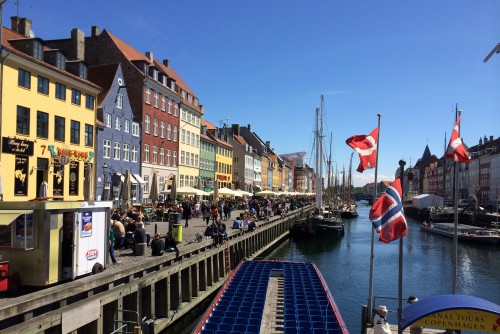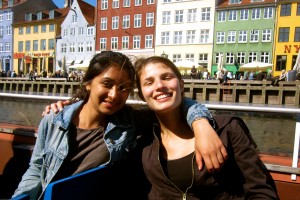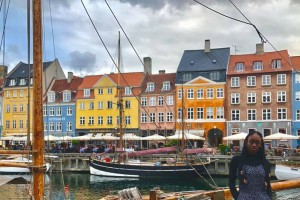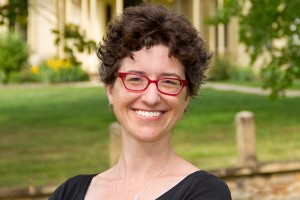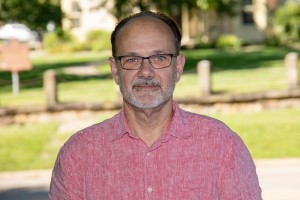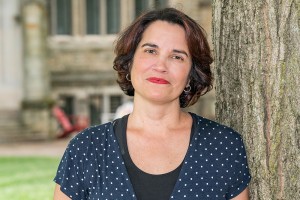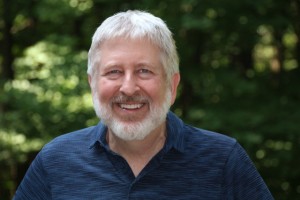Under the guidance of Kenyon faculty members in residence, you and a cohort of fellow first-year students will travel to Copenhagen, where you will take courses that mirror a first semester at Kenyon and participate in hands-on learning opportunities and co-curricular travel. This semester-long program is designed to immerse you in intellectual and cultural adventures that integrate meaningfully into Kenyon's liberal arts curriculum.
The Kenyon-Copenhagen Experience
Connecting both medieval and modern-day Europe, Copenhagen consistently tops surveys of the world's best places to live, offering a village-like atmosphere with a vibrant big city vibe. Students will study in the heart of Copenhagen, within walking distance to the waterfront, research libraries, political agencies, quaint cafés and rich cultural activities.
Broadening Perspectives
Learning opportunities beyond the classroom include experiential activities and co-curricular travels led by Kenyon faculty members in residence. Students will return to Gambier for the spring semester with a global perspective, a close community of peers and valuable academic and research skills that will enrich the rest of your Kenyon experience.
Faculty Resident Directors
Professor of English Sergei Lobanov-Rostovsky, Associate Professor of English Sarah Heidt '97 and Associate Professor of Psychology Irene López will serve as resident directors of the inaugural Kenyon-Copenhagen Program. Professors Lobanov-Rostovsky and Heidt have directed Kenyon's longtime study-abroad program in Exeter, Professor López has directed the Kenyon-Rome program, and Professor Alexander has led an off-campus study project in Belize.
Sarah Heidt
Professor Heidt specializes in 19th-century British literature and culture, auto/biography and life writing, and women's writing. A recipient of the Trustee Teaching Excellence Award and the Faculty Advising Award, she is particularly fond of George Eliot, Virginia Woolf, Ali Smith, Rebecca Solnit, Toni Morrison and the Oxford English Dictionary.
Sergei Lobanov-Rostovsky
Professor Lobanov-Rostovsky teaches courses on Shakespeare, Renaissance poetry, film and creative writing. A recipient of the Trustee Award for Teaching Excellence, he also serves as associate editor of the Kenyon Review. He has published a series of crime novels under the pseudonym Kenneth Abel and developed Kenyon workshops on science writing.
Irene López
Irene López is a clinical psychologist who specializes in cross-cultural psychopathology, minority women’s mental health and socioeconomic status. A recipient of the Trustee Teaching Excellence Award and Harvey F. Lodish Junior Faculty Development Professor in the Natural Sciences Award, she completed a Fulbright in Hungary where she lectured on the psychology of immigration. She is the co-editor of “The Wiley Handbook of Collaborative Online Learning and Intercultural Engagement.”
Robert Alexander
Rob Alexander is an ecological economist who specializes in bioeconomic modeling and the economics of biodiversity conservation. One of the first to apply multispecies modeling to terrestrial bioeconomic models, he is working on determining the conditions under which trade may support the conservation of endangered species. He has taught water economics at the United Nations Environmental Program and worked on conservation issues at Kruger National Park and the State Forestry Administration of China.
Program Details
Students will take a core Kenyon course plus four others offered by DIS Copenhagen, including one on Danish language and culture.
Making a Life in the World (ENGL 103)
How do we go about making our lives? How do we know whether we’re making them well? And how can literature help us ask (and possibly begin to answer) those questions? In this course, we’ll strengthen our abilities to read poetry, fiction, non-fiction prose, graphic narrative and film, as well as to speak, listen and write with clarity and nuance. We’ll also explore how the beauties and difficulties of literary and cinematic works can challenge us to richer, more complicated ways of understanding our lives and the lives of others. We will undertake critical and creative writing projects, using writing as a tool for thinking and exploring the world and the ways we live within it.
Introduction to Environmental Studies (ENVS 112)
This course examines contemporary environmental problems, introducing the major concepts pertaining to human interactions with the biosphere. We will explore this interaction at both local and global scales. Course topics include basic principles of ecology (flows of energy, cycling of matter and the role of feedback), the impacts of human technology, the roots of our perceptions about and reactions to nature, the social and legal framework for responding to problems and economic issues surrounding environmental issues. We will discuss methods for answering questions regarding the consequences of our actions and, using a systems approach, focus on methods for organizing information to evaluate complex issues.
Introduction to Psychology (PSYC 100)
Psychology is the study of behavior and mental processes. In this introductory course, we will explore a variety of areas in which psychologists conduct research: the biological foundations of behavior, sensory and perceptual processes, cognition, learning and memory, developmental psychology, personality and social psychology, psychological disorders, and variability in behavior related to culture.
Students will live in a residential community of dorm-style or apartment buildings with members of their Kenyon cohort and fellow DIS students. The housing situation will bring together a diverse group of students while ensuring students live with English speakers. Part of living and studying in Copenhagen means that, just as the Copenhageners do, students commute by bike, bus, train or metro.
Cost
Students participating in the Kenyon-Copenhagen program pay Kenyon tuition, room and board. These fees cover students' program tuition, accommodations in Washington, D.C., and roundtrip airfare from D.C. to Copenhagen, metro/bus passes, a meal stipend and co-curricular travel.
Financial Aid
Financial aid awards will apply to this program. For the purpose of scholarships and loans, Kenyon-Copenhagen students are considered full-time Kenyon students. Financial aid recipients will receive detailed information on how their financial aid package (including any accepted loans) will be applied toward the program.
Stipend
Should students choose to launch their Kenyon career in Copenhagen, they will be provided a $5,000 stipend to help cover travel expenses to Washington D.C., and personal expenses (including books, laundry, mail, printing, supplemental food and personal expenses).
The program will kick off in Washington, D.C., with a Kenyon-Copenhagen orientation for students and their families. Program participants and resident directors will travel to Copenhagen, arriving August 21 and participating in the DIS arrival workshop August 22-25. A study break is set for November 24-28, and the semester ends December 18.
